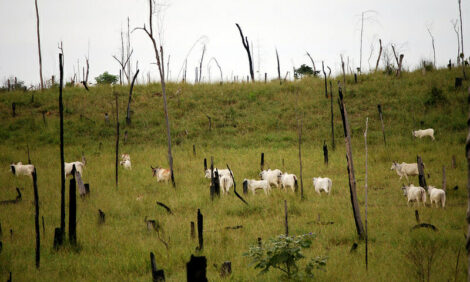



Canada’s 11th Native BSE Case Shows USDA Ignoring Real Risks
US - R-CALF USA claims the U.S. Department of Agriculture has failed its responsibility to adequately protect the U.S. cattle herd, the U.S. beef supply, U.S. export markets and U.S. consumers from Canada’s widespread problem with bovine spongiform encephalopathy.Wednesday’s announcement by the Canadian Food Inspection Agency of its 10th case of BSE -- which excludes a Washington state case in a cow imported from Canada -- shows that the Canadian feed ban, implemented in 1997, has failed to prevent continued exposure to BSE in Canada, he said.
Based on CFIA’s announcement, this animal n at only 5-1/2 years old n is the second youngest case of BSE detected in Canada. The youngest case was a 50 month-old animal confirmed in July 2006. Additionally, this is the second case detected in British Columbia. Another case was discovered in Manitoba, while most have originated in Alberta. This indicates BSE in Canada is not isolated in any particular province within the country, Bullard said. And while CFIA assures the public that the BSE-infected cattle were kept out of the human and animal feed chains, neither CFIA nor USDA acknowledges the obvious: that there have apparently been three or more generations of other, undetected BSE-infected cattle that contaminated feed supplies in Canada for at least half a dozen years, and for years after Canada’s feed ban went into effect, he added.
Bullard said despite a very limited amount of testing, six cases of BSE have been confirmed in Canadian cattle born after Canada implemented its feed ban in 1997 n despite USDA’s unsupported insistence that the Canadian feed ban has been effective in preventing the spread of the disease.
“If it weren’t for R-CALF USA’s continued efforts, through the administrative process and litigation to force USDA to look more closely at the BSE risk from Canadian imports, then USDA likely would’ve already allowed imports of both Canadian cattle and meat from Canadian cattle that were born the same time as these six cases,” said R-CALF USA Vice President Randy Stevenson in the press release. “And now USDA seems poised to do so even as the evidence of BSE infection in the Canadian herd continues to pile up.
“USDA officials have stated they hope to begin importing Canadian cattle over 30 months of age into the U.S. no later than late summer or early fall,” he said. “But according to policy established by R-CALF membership, our board has been instructed to take appropriate action to prevent the importation of OTM cattle from BSE-affected countries. You would think USDA would step back and try to look at Canada’s problem objectively, but it appears the agency is dead set on unrestricted trade with Canada, regardless of the risk.
Source: AG Weekly


